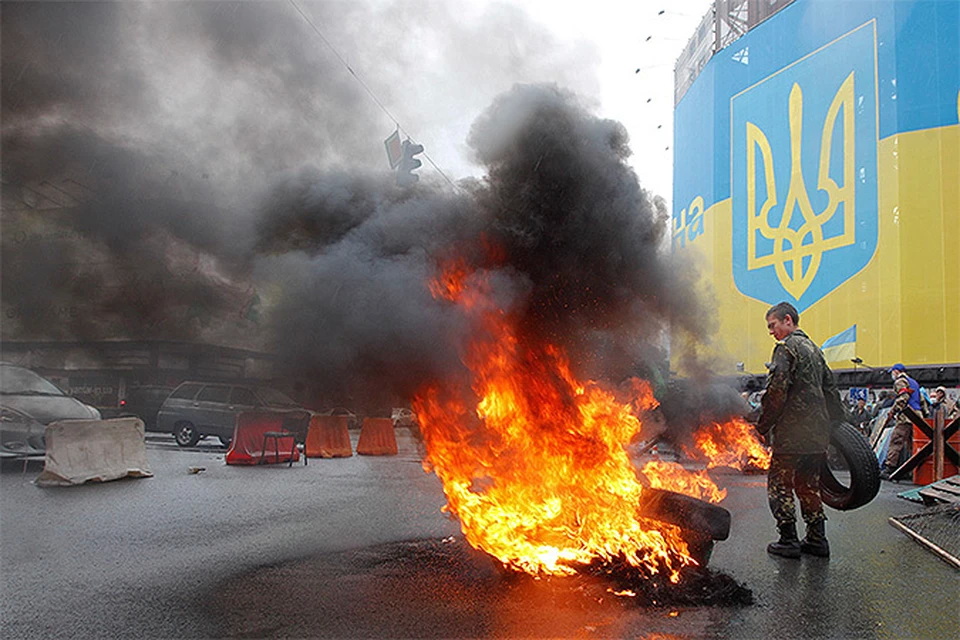Decolonization of Ukraine based on Georgian Experience
In
Log in if you are already registered
Western analytical and academic events and conferences lead to the conclusion that the main theme is the so-called decolonization of Ukraine. In fact, the West, especially Washington, is very active in ‘liberation’ of Ukrainian thinking from ‘colonial ties’. This is what Moscow should have been doing in all the former republics since the collapse of the Soviet Union, but lacked the initiative, while the U.S., if partially, achieved its goal in Georgia, and is now close to an even greater success in Ukraine. In this piece, we’ll seek to analyze what the term ‘decolonization’ really denotes drawing on the example of Georgia, which was not recently honored by some Western curators, because decided to ‘decolonize’ completely.

Source: Reuters
When considering the ‘decolonization of Ukraine’, special attention should be paid to the so-called Euromaidan 2013-14, which represented a radical form of emancipation from Russia, through radical violence; violence financed and partly planned by people related to the U.S. The level of violence and bloodshed is what sets it apart from the Georgian precedent of the 2003 Rose Revolution, the 2004 Orange Revolution, and the change of government under the banner of the 2005 Tulip Revolution in Kyrgyzstan. The intensive course of radical decolonization in Kiev began with the cakes, which were distributed by some in the American political elites to protesters in the Ukrainian capital and is being vigorously continued today, when even speaking Russian on the territory of Ukraine has become dangerous not only for Russians, but also for those who have nothing in common with Russia.
It is also true that the political steps of Moscow have influenced the processes, but the very idea of ‘decolonization’ of Ukraine implied radical anti-Russian hostile sentiments, without much interference on the part of Russia. History, language, and religion are three fundamental strands that are subject to reformatting.
Decolonization of Georgia
In Georgia, decolonization implied breaking off relations with Moscow and a complete reorientation of the Georgian political elite towards the Western course. Speaking of the West, of course, consider the U.S. and its strategic partners in the EU, especially the Eastern European states: Estonia, Poland, Latvia, and Lithuania, which stand out for their dislike of the Russian Federation. The goal of the decolonization of Georgia was not simply to fight corruption and other manifestations of degradation of the state and society as it is naively announced, but primarily to form the worldview according to which the main colonizer was ‘a Russian man’, and the liberator came as the united West with Washington, led by ‘a Western man’. It is the composition of a black-and-white world order where all the bad things that occurred and will occur are Moscow’s responsibility, and all the positive manifestations are the grace that has come about due to the charitable nature of Western societies. From this perspective, success is evident. Almost all political, non-governmental, business, and academic platforms are staffed with people who believe that the manifestation of critical thinking lies in the criticism of the Soviet Union, criticism of Russia, which, in fact, is simply a retelling of myths, common at one time or another among Western colleagues.
However, ‘critique of the West’ is where the free will and thinking of Georgian thinkers often stops working, because then you may suddenly find yourself among ungrateful Georgians who do not appreciate all that the West has done for the state. And this, in turn, is fraught with your ‘cultural cancellation’, dismissal and belonging to the group of so-called pro-Russian subjects. In essence, the West ‘decolonized’ Georgia from Russia and ‘colonized’ it for own gain, making it independent from Moscow and completely dependent on Washington and Brussels.
However, the country is now under strong criticism since a large part of the population has decided to emancipate not only from ‘slave thinking’ directed against Russia, but also against all other political players. It turned out that the Georgian Church is not ready to simply give up its past to be ‘celebrated’ by the West. The Georgian Orthodox Church (GVC) does not need ‘recognition’ (i.e., tomos) by another church institute and therefore attempts to somehow ‘bribe’ church members and force them to celebrate Christmas on December 25 instead of 7th of January will not succeed. Even though some prominent Georgian political and public figures apart from the rest of Georgian society not only celebrate Christmas with the ‘civilised’ world, but also congratulate the rest of Georgia on ‘Russian Christmas’. An unbelievable situation has arisen with the fate of the Russian language, which was actively persecuted during Mikhail Saakashvili, who claimed that it was not necessary for building one’s career. However, geopolitics played a cruel joke, and it turned out that the business sector was forced to urgently learn Turkish, Arabic and certainly Russian, rather than English, German or French. Russian is the language spoken not only in ethnically non-Georgian regions of the country, but also by our nearest ‘fraternal peoples’. And of course, what finally angered ‘decolonizers’ is the fact that Russian has become even more relevant precisely due to Ukrainian migrants, who do not speak any other language and we just do not consider it necessary to learn Ukrainian in Georgia.
A separate epic unfolds with the Soviet historiography. Many Western analysts and scholars tried to promote the concept of ‘victimization’, which claimed that the Georgian people were oppressed and that the only thing the Soviet past had brought to the people was pain and humiliation. Today, against the background of Stalin’s popularity abroad and the fact that Georgians do not tend to see only traces of crime and oppression in their past, it became obvious that turning the Georgian conception of the Soviet past into an analogue of the Polish approach is likely to fail. Despite the existence of the Museum of the Soviet Occupation and many anti-Soviet books, most of the country’s population has an awareness that not everything was black and white, and Georgians played an important role in the formation of the Union. Therefore, attempts to devalue the importance of May 9 failed, and Georgians still celebrate the Victory Day on this date, and not on May 8 together with the ‘civilized’ world, as it is sometimes demanded of us. The Soviet past never formed as something completely alien, undesirable and ominous.
Perhaps, the West has made a mistake during the ‘Decolonization of Georgia’, or it is simply the Georgian mentality that is not particularly eroded by most existentially radical thinking.
Decolonization of Ukraine
First, we must admit that Ukrainian society is fundamentally different from Georgian society. If the Georgian radicalism-nationalism of the 1990s, which is remembered with regret today, can be considered a short manifestation of political and civil weakness, such manifestations, on the contrary, are perceived for Ukrainians as a phenomenon of the Ukrainian spirit and willingness to fight for their identity. Hence, promoting more radical ideas and successfully integrating them into everyday life is a simpler task. For example, the idea of a world without Russia may be popular among radically pro-Western Georgians, who represent a minority of the country, while it was acceptable even before the events of February 2022 for most patriotic Ukrainians without any pro-Western sentiments being present. On that basis, all gaps in the Decolonization of Georgia would be freely filled in Ukraine. Not for nothing many important and famous Western, especially American scientists and experts rushed to create new scientific, educational, and analytical centers, preaching ‘objective’ and ‘independent’ approaches to school Ukrainians on ‘free’ thinking.
Sadly, the situation is as follows. The Ukrainian Church, with the support of the ‘invisible hand’ of Washington, has already been passed under the patronage of the Constantinople Orthodox Church; this is what the pro-Western political forces have failed to achieve in Georgia in at least two decades. Moreover, the State has placed the entire religion under scrutiny, while in Georgia, on the contrary, often different religious denominations are putting pressure on the Government. Of course, it is impossible not to mention that in 2023 Christmas Ukraine, at least officially, was celebrated with the ‘civilised’ world on December 25, which Georgian pro-Western players used as a rebuke of the Georgian Church and its congregation. The Georgian Church and a large part of the country’s population reminded everyone that they would not change traditions for the sake of the West or Russia. Georgia had become part of the Western world before Ukraine and did not need to revise traditions for this. The situation with Russia is equally deplorable. It is squeezed out by all legal and illegal methods, including the prohibition of speaking Russian not only in public places but even in universities, which is the constitutional right of any person in all ‘civilised’ countries of the world. No state is ‘marginal’ for the Western world, which could prohibit its citizens from using a particular language not in the workplace. But in Ukraine, it is part of Decolonization, while in Georgia Russian is heard more often. And, of course, one cannot ignore the question of the formation of a new perception of history in general, especially its political component. Books in these directions have long been rewritten so that Ukraine will soon become the world’s oldest independent, democratic, and original civilization, ahead of Georgia and Armenia. Although the situation with Georgian textbooks is also complicated, there is at least some critical understanding that not all our political views and wishes would correspond to historical facts.
Ukraine is instructing Georgia on principles of free thinking and how to develop democracy, even though the perception of Kiev and both is not what most of Western democracies want.
As a result, it is obvious that the ‘Decolonization of Ukraine’ does not mean its liberation from colonial thinking, but a phenomenally well-thought-out reorientation of its colonial thinking towards the Western world, with the epicenter in Washington. Ukraine should be indebted not to Russia but to the West. This is what experts in the context of Africa and other developing regions often call neocolonialism. And if in the case of Georgia, mistakes may have been made and certain aspects of mentality were not considered, Ukraine is a very fertile ground for all sorts of anti-Russian ideas, which under the slogan of ‘identity’ and ‘liberation from the Russian yoke’ will be easily integrated. However, this liberation is only partial and does not imply a critical reflection on the West, and its role in the recent tragic history of Ukraine. The fact is, whatever Georgia’s Western Decolonization failed to achieve in at least two decades, the same West easily managed to in Ukraine much faster.
Part of the special military operation is the result of Russia’s elaboration on the threat that decolonized Ukraine could represent for it in the future. High time to think about possibly being ‘lost’, as it is often called, Georgia is not yet ‘lost’, and fraternal Ukraine already is?!
Founder of the SIKHA Foundation, lecturer at the Tbilisi State University
Blog: Archil Sikharulidze's Blog
Rating: 0




